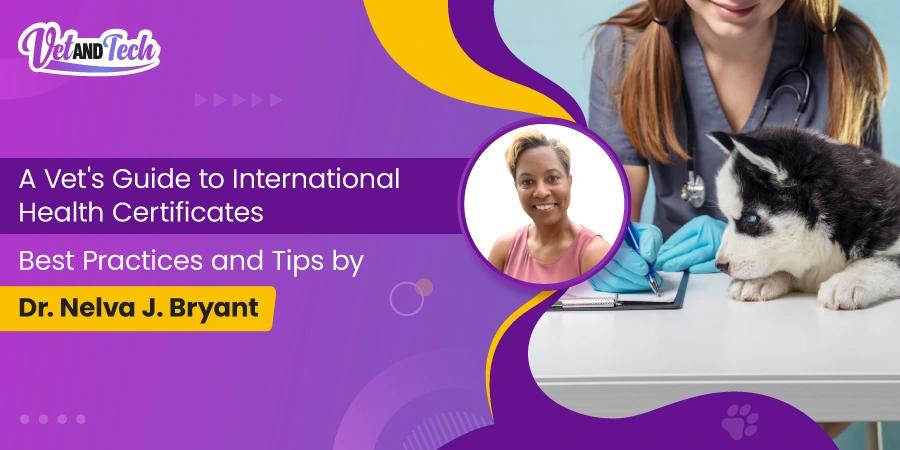Best Practices for Completing International Health Certificates: A Guide for Veterinary Professionals
By Dr. Nelva J. Bryant, DVM, The Pet Travel Expert
As international travel with pets continues to rise, veterinarians are increasingly called upon to assist clients in meeting export requirements for companion animals. Completing an International Health Certificate (IHC) is not just about filling out forms—it is a critical responsibility that ensures the health and welfare of animals during travel and entry into a new country. The IHC must be completed by a USDA Accredited Veterinarian.
Improperly completed IHC can result in denied entry, extended quarantine, travel delays, or even return to the country of origin — all of which can have serious consequences for the pet, the client, and the reputation of the attending veterinarian.
Here’s what veterinary professionals must know to properly and confidently complete international health certificates.
1. Understand That Each Country Has Unique Requirements
There is no universal international health certificate. Each destination country establishes its own specific animal import requirements, which may vary based on:
- Pet species
- Rabies status (country-specific)
- Vaccination schedules
- Microchip identification
- Parasite treatments
- Laboratory testing protocols (i.e. Rabies Titer Test, Brucellosis Test, etc.)
- Determine the required tests, submit diagnostic samples to Approved Laboratories, follow the testing times, and include the original results with the certificate for USDA endorsement (if required).
- US Approved Laboratories include:
- Kansas State University Rabies Laboratory
- Auburn University College of Veterinary Medicine-Virology Laboratory
- DoD Food Analysis & Diagnostic Laboratory (for military/government needs)
- University of Missouri Veterinary Medical Diagnostic Laboratory
Before starting the process, always research the USDA APHIS Pet Travel Website and the destination countries animal entry requirements. Requirements may change without notice. Additionally, never assume that requirements for one country apply to another.
2. Initiate the Process Early
Many countries have waiting periods after vaccinations, microchipping, and laboratory testing. Some procedures, like rabies titer testing for the EU, Japan, or Australia, can take several months to finalize.
To help with early planning, consider asking pet owners about their travel plans during patient intake. You might ask:
• Are you planning an international trip with your pet?
- If yes, please share the destination, expected travel dates (including return), mode of transportation, and any other details.
Veterinarians should advise pet owners to begin preparing for international travel at least six months to one year in advance, depending on the destination country’s requirements.
It’s equally important to plan for the pet’s return to the United States, which may involve additional documentation, vaccination timing, or re-entry permits—especially if traveling from a rabies high-risk country.
3. Confirm Microchip Compliance
Most countries require that pets are implanted with an ISO 11784/11785 compliant microchip before any rabies vaccination is given.
Be sure to:
- Scan the microchip at the beginning of the appointment.
- Record the microchip number accurately on all paperwork.
- If the pet’s microchip is not ISO-compliant, recommend implanting a compliant chip.
Earn 1 Free CE Credit: Register to watch recorded webinar session!
Presented by Pet Travel Expert “Nelva J. Bryant” — Understand variations of pet travel requirements and how to prepare.
4. Use Country-Specific Health Certificate Templates
Always use the most up-to-date and country-specific certificate templates provided by USDA APHIS.
- Creating "custom" versions or making manual alterations to certificates is not permitted.
- Ensure that entries are typed carefully or handwritten legibly.
- Dates should be formatted according to the requirements of the destination country (e.g., DD/MM/YYYY or MM/DD/YYYY).
Make sure all entries are clear, complete, and error-free. Keep in mind that using white-out or making corrections on official certificates is not allowed.
5. Ensure Proper Endorsement Timing
Many international health certificates need to be endorsed by the USDA. Here are some key points to keep in mind:
- Certain endorsements can be processed electronically through the VEHCS system, while others may require a physical submission.
- Certificates need to be issued within a specific timeframe, such as 10 days before travel.
- Some countries also ask for extra documents, like lab reports or vaccination records, to accompany the certificate.
Be sure to communicate closely with your local USDA APHIS Endorsement office to make sure everything is completed correctly and on schedule.
6. Educate Clients on Their Responsibilities
While veterinarians assist in preparation, the ultimate responsibility for meeting travel requirements lies with the pet owner. Veterinary teams should:
- Recommend clients follow the guidelines provided by USDA’s Take a Pet From the United States to Another Country (Export)
- Encourage clients to comply with airline policies (which differ from country regulations).
- Warn clients about connecting flights through countries with additional requirements (e.g., pet transit through the UK).
- Remind clients to carry multiple original copies of their documents.
7. Protect Your License and Reputation
It’s crucial to understand that errors or incomplete International Health Certificates (IHC) can have serious consequences, including the possibility of a pet being quarantined, deported, or even euthanized. Additionally, veterinarians could face USDA investigations, suspension of accreditation, or civil penalties.
To protect both your practice and the pets you care for, it's important to certify only the information you have personally verified—such as vaccination records and examination findings. Always remember to rely on your expertise rather than solely on the owner's assurances. By doing so, you help ensure a smooth and safe journey for our furry friends!
Conclusion
Filling out international health certificates is an important task that comes with a lot of responsibility, and it requires accuracy and attention to detail. It’s also a wonderful opportunity to build a strong partnership with your clients and regulatory authorities. By following best practices, veterinary professionals can help ensure that pets have a smooth travel experience while also prioritizing their health and well-being. Together, we can make each pet's journey a safe and happy one!
For veterinary teams, keeping up-to-date with international pet travel requirements is key — it helps ensure the safety of your pet patients, provides valuable support to your clients, and upholds the high standards that define our profession.
If you’d like to hear from more from Dr. Nelva Bryant, click here








